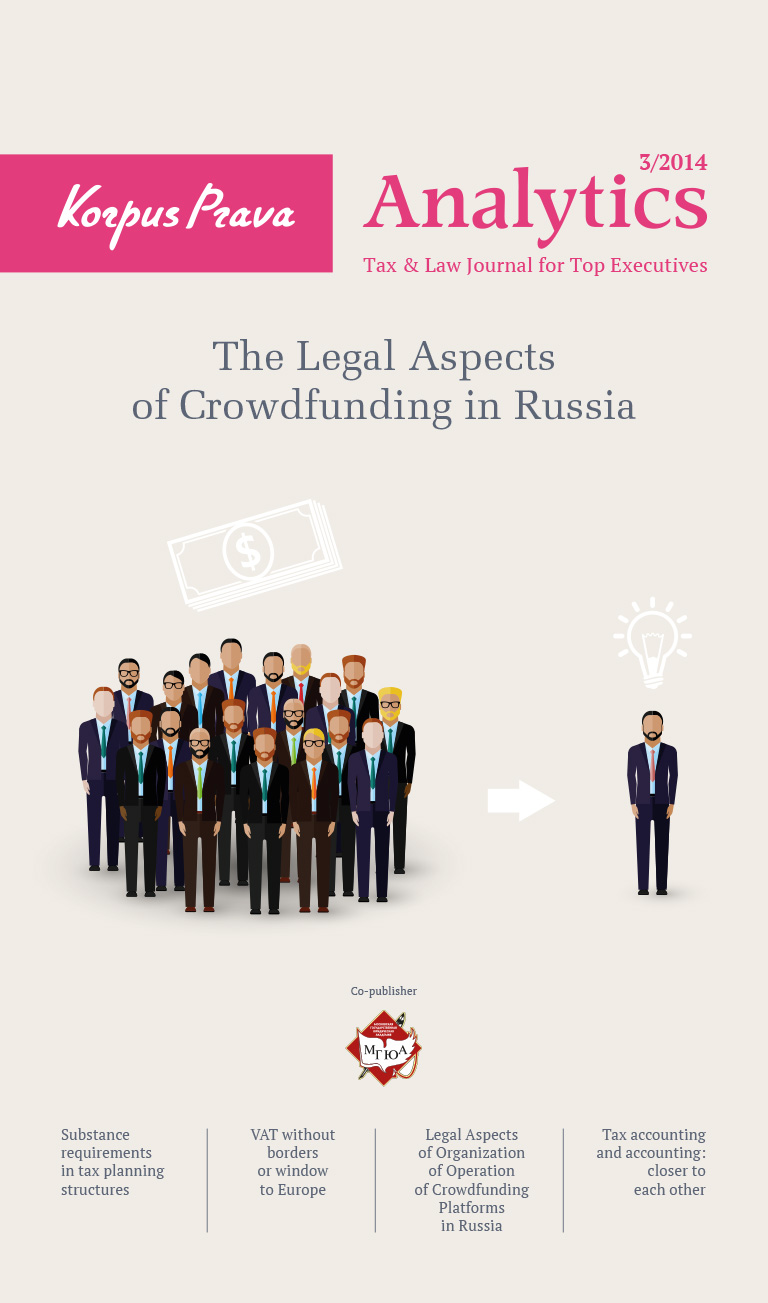- Cyprus Citizenship Scheme for Foreign Investors
- Squeezed But Pleased: Taxation of Passive Income in the European Union
- VAT Without Borders or Window to Europe
- Legal Aspects of Organization of Operation of Crowdfunding Platforms in Russia
- Substance Requirements in Tax Planning Structures
- “Deposit Splitting” of Individuals. Legal Civil and Criminal Aspects
I Spy With My Little Eye: Electronic Register of Beneficiaries in the Cayman Islands
Transparency tendencies continue to win over international corporate community, including offshore jurisdictions. There’s nothing new about the fact that certain offshore jurisdictions have already defined requirements on maintaining the register of directors, collecting information on shareholders and beneficiaries. Jurisdictions of the Seychelles and the British Virgin Islands may serve as examples of such jurisdictions. Some jurisdictions only start to introduce such requirements, while others tighten or upgrade them. This article will cover the situation in the Cayman Islands.
It must be mentioned that before recent amendments to legislation that will be discussed below, requirements on maintaining the register of beneficiaries didn’t exist. Legislators not only introduced these requirements, but immediately made them more severe in comparison with other offshore jurisdictions.
On April 7, 2017 the official edition of The Extraordinary Gazette of the Cayman Islands published a number of legislative changes related to beneficiary owners, including the Companies Act. The changes will affect companies registered under the Companies Act, except for:
- Companies with shares listed at the stock exchange of the Cayman Islands or any other certified stock exchange;
- Companies registered or licensed in accordance with the Law On monetary management;
- Companies registered, managed and administered by such authorised entities as special purpose ventures (SPV), private equity funds, investment companies and investment funds;
- Companies in the capacity of principal partners of SPV, private equity funds, investment companies and investment funds. Registration, administration and management of partner companies should be performed by duly authorised persons;
- Companies exempt from taxation.
In accordance with new amendments companies are now obliged to identify beneficiary owners. Beneficiary owners are defined as individuals who meet one or more of the following conditions:
- Hold, directly or indirectly, more than 25% shares in the company;
- Hold, directly or indirectly, more than 25% voting rights in the company;
- Hold the right, directly or indirectly, to appoint or remove a majority of the board of directors of the company.
In case one fails to identify an individual that meets at least one of these conditions, for example, shareholders of the company are legal entities, it’s required to analyze the whole shareholding structure in order to identify individuals performing or having the right to perform absolute control over the company. Director, professional manager and professional expert do not qualify as beneficiary owners. In order to identify beneficiary owners and associated legal entities, companies shall deliver notifications to beneficiary owners and legal entities with the purpose of confirmation, change or rebuttal of information. Response period for such notifications shall equal 1 month. In case no information is submitted, companies shall be able to make the following restrictions:
- Any deals on transfer of possession shall be deemed invalid;
- No rights ensuing from possession shall be performed;
- No shares shall be issued on behalf of a shareholder or in connection with an offer to a shareholder;
- No payments connected with possession to authorized capital or otherwise shall be made, except for winding-up.
The company may lift restrictions if requirements of the notification are satisfied, reasonable excuse for non-submitting of information is provided or third party rights are affected. Third parties shall also be entitled to debate restrictions affecting their rights in court. Persons that violate established restrictions will be fined in the amount of 5 000 USD. Companies and individuals mentioned in these restrictions are entitled to apply to court for abolition of restrictions.
Companies are also obliged to maintain the register of beneficiary owners, which must be kept at the registered office of the company. In order to maintain their corporate register resident companies of the Cayman Islands will have to address their agents or the Registrar. Meanwhile, the Registrar may impose additional fee for this service. Companies exempt from taxation, non-resident companies and companies registered in accordance with 2011 Law On Special Economic Zones are provided with the service of register maintaining by incorporation agents. In order to maintain the register of beneficiaries, companies shall submit all the acquired information to incorporation agents or the Registrar. The register of beneficiaries will contain the following details:
- Individual beneficiaries or controlling parties:
- Name;
- Address;
- Date of birth;
- Passport or ID details;
- Starting date of beneficial ownership;
- Legal entities participating in beneficial ownership:
- Name;
- Address details;
- Legal form and governing legislation;
- Registration number, if any, and register name;
- Starting date of beneficial ownership participation.
In case of substantial changes, a beneficiary owner or a company with beneficial ownership participation must file information on these changes within a month since these changes occurred. Companies in their turn must collect information on changes by sending notifications in the manner mentioned before, and then file this information to the incorporation agent or the Registrar. The incorporation agent and the Registrar must in turn promptly update registers of beneficiary owners. A person may be deleted from the register of beneficiary owners in five years after the date when the incorporation agent or the Registrar learned about the termination of his beneficial ownership participation. In case beneficiaries or legal entities with beneficial ownership participation do not agree with the content of the register of beneficiaries, they may appeal to court.
The competent authority of the Cayman Islands, i.e. Minister or a duly authorized person, will set up a search platform incorporating information from all registers of beneficiaries. Incorporation agents and the Registrar must file the information from the registers of beneficiaries to the competent authority for the purposes of information database update. The platform will be protected from unauthorized access. Access to the platform will be granted only to the following authorities:
- Financial intelligence unit in accordance with the Proceeds of Crime Act;
- Financial Statement Department in accordance with the Proceeds of Crime Act;
- Monetary Authority of the Cayman Islands;
- Tax Information Department in accordance with clause 4 of the Tax Information Act;
- Other authorities that are granted the right for monitoring in accordance with clause 4(9) of the Proceeds of Crime Act.
The abovementioned authorities will be able to start their search only after confirmation of a previously filed request by the competent authority. Search by request from the Financial intelligence unit for a foreign country will be performed in case this foreign country has signed a relevant agreement on information exchange with the government of the Cayman Islands. By now this agreement has been signed by Great Britain.
Legislation carries significant penalties for the violation of the established requirements. Thus, violations performed by companies are punishable by fines amounting from 5 to 25 000 dollars. The company may be held responsible not earlier than a year after legal amendments come into force. Failure to provide information or false representation by individuals is punishable by up to 10 000 dollar fine and/or up to two years in prison. Illegal search for the registers of beneficiaries and disclosure of information are also punishable by 5 000 dollar fine and/or up to 12 months in prison.
Legislators reserved the right to apply exceptions to individuals and companies under the abovementioned legal amendments to the competent authorities. These exceptions will be based on the criteria determined by the competent authorities. Legislators also reserve the right to make regulation amendments.
By now, the search for beneficiaries may be performed only in the Cayman Islands, and on the international level the information on beneficiaries may be submitted only to the competent authorities of Great Britain. It’s difficult to predict what other countries will sign this agreement with the Cayman Islands. Even with a blocked access one can no longer claim full confidentiality for beneficiaries, as was formerly the case under this jurisdiction.
Your subscription to our journal will definitely boost the efficiency of your specialists and downsize your expenses for consultants.
The journal is available free of charge in the electronic version.
Free Download

